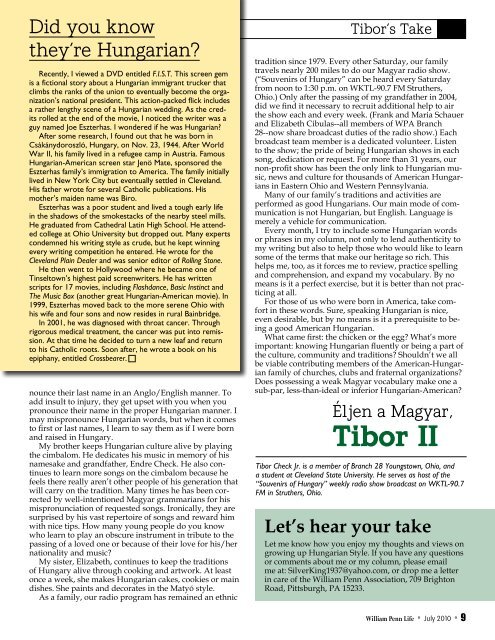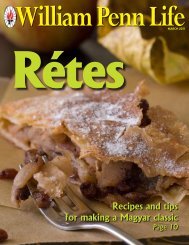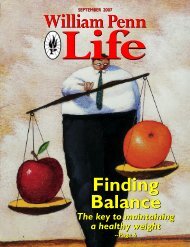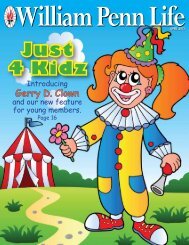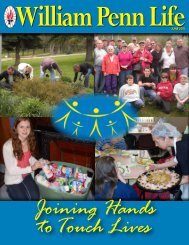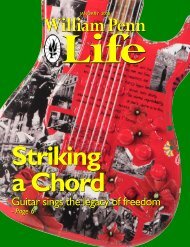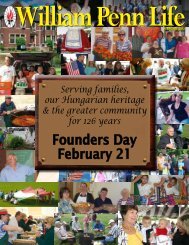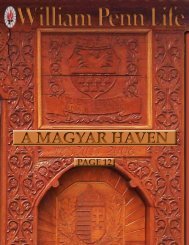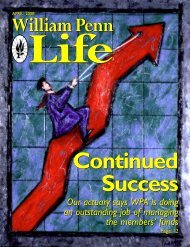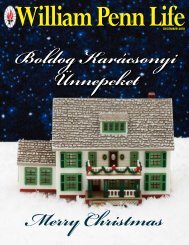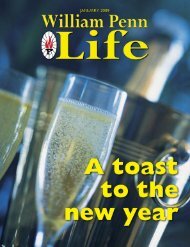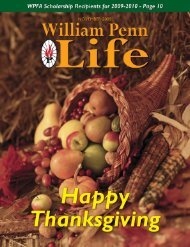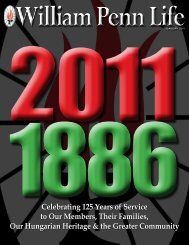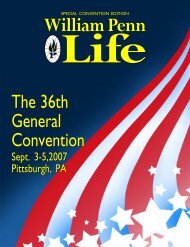The Home Office - William Penn Life
The Home Office - William Penn Life
The Home Office - William Penn Life
- No tags were found...
You also want an ePaper? Increase the reach of your titles
YUMPU automatically turns print PDFs into web optimized ePapers that Google loves.
Did you know<br />
they’re Hungarian<br />
Recently, I viewed a DVD entitled F.I.S.T. This screen gem<br />
is a fictional story about a Hungarian immigrant trucker that<br />
climbs the ranks of the union to eventually become the organization’s<br />
national president. This action-packed flick includes<br />
a rather lengthy scene of a Hungarian wedding. As the credits<br />
rolled at the end of the movie, I noticed the writer was a<br />
guy named Joe Eszterhas. I wondered if he was Hungarian<br />
After some research, I found out that he was born in<br />
Csákánydoroszló, Hungary, on Nov. 23, 1944. After World<br />
War II, his family lived in a refugee camp in Austria. Famous<br />
Hungarian-American screen star Jenö Mate, sponsored the<br />
Eszterhas family’s immigration to America. <strong>The</strong> family initially<br />
lived in New York City but eventually settled in Cleveland.<br />
His father wrote for several Catholic publications. His<br />
mother’s maiden name was Biro.<br />
Eszterhas was a poor student and lived a tough early life<br />
in the shadows of the smokestacks of the nearby steel mills.<br />
He graduated from Cathedral Latin High School. He attended<br />
college at Ohio University but dropped out. Many experts<br />
condemned his writing style as crude, but he kept winning<br />
every writing competition he entered. He wrote for the<br />
Cleveland Plain Dealer and was senior editor of Rolling Stone.<br />
He then went to Hollywood where he became one of<br />
Tinseltown’s highest paid screenwriters. He has written<br />
scripts for 17 movies, including Flashdance, Basic Instinct and<br />
<strong>The</strong> Music Box (another great Hungarian-American movie). In<br />
1999, Eszterhas moved back to the more serene Ohio with<br />
his wife and four sons and now resides in rural Bainbridge.<br />
In 2001, he was diagnosed with throat cancer. Through<br />
rigorous medical treatment, the cancer was put into remission.<br />
At that time he decided to turn a new leaf and return<br />
to his Catholic roots. Soon after, he wrote a book on his<br />
epiphany, entitled Crossbearer.<br />
nounce their last name in an Anglo/English manner. To<br />
add insult to injury, they get upset with you when you<br />
pronounce their name in the proper Hungarian manner. I<br />
may mispronounce Hungarian words, but when it comes<br />
to first or last names, I learn to say them as if I were born<br />
and raised in Hungary.<br />
My brother keeps Hungarian culture alive by playing<br />
the cimbalom. He dedicates his music in memory of his<br />
namesake and grandfather, Endre Check. He also continues<br />
to learn more songs on the cimbalom because he<br />
feels there really aren’t other people of his generation that<br />
will carry on the tradition. Many times he has been corrected<br />
by well-intentioned Magyar grammarians for his<br />
mispronunciation of requested songs. Ironically, they are<br />
surprised by his vast repertoire of songs and reward him<br />
with nice tips. How many young people do you know<br />
who learn to play an obscure instrument in tribute to the<br />
passing of a loved one or because of their love for his/her<br />
nationality and music<br />
My sister, Elizabeth, continues to keep the traditions<br />
of Hungary alive through cooking and artwork. At least<br />
once a week, she makes Hungarian cakes, cookies or main<br />
dishes. She paints and decorates in the Matyó style.<br />
As a family, our radio program has remained an ethnic<br />
Tibor’s Take<br />
tradition since 1979. Every other Saturday, our family<br />
travels nearly 200 miles to do our Magyar radio show.<br />
(“Souvenirs of Hungary” can be heard every Saturday<br />
from noon to 1:30 p.m. on WKTL-90.7 FM Struthers,<br />
Ohio.) Only after the passing of my grandfather in 2004,<br />
did we find it necessary to recruit additional help to air<br />
the show each and every week. (Frank and Maria Schauer<br />
and Elizabeth Cibulas--all members of WPA Branch<br />
28--now share broadcast duties of the radio show.) Each<br />
broadcast team member is a dedicated volunteer. Listen<br />
to the show; the pride of being Hungarian shows in each<br />
song, dedication or request. For more than 31 years, our<br />
non-profit show has been the only link to Hungarian music,<br />
news and culture for thousands of American Hungarians<br />
in Eastern Ohio and Western <strong>Penn</strong>sylvania.<br />
Many of our family’s traditions and activities are<br />
performed as good Hungarians. Our main mode of communication<br />
is not Hungarian, but English. Language is<br />
merely a vehicle for communication.<br />
Every month, I try to include some Hungarian words<br />
or phrases in my column, not only to lend authenticity to<br />
my writing but also to help those who would like to learn<br />
some of the terms that make our heritage so rich. This<br />
helps me, too, as it forces me to review, practice spelling<br />
and comprehension, and expand my vocabulary. By no<br />
means is it a perfect exercise, but it is better than not practicing<br />
at all.<br />
For those of us who were born in America, take comfort<br />
in these words. Sure, speaking Hungarian is nice,<br />
even desirable, but by no means is it a prerequisite to being<br />
a good American Hungarian.<br />
What came first: the chicken or the egg What’s more<br />
important: knowing Hungarian fluently or being a part of<br />
the culture, community and traditions Shouldn’t we all<br />
be viable contributing members of the American-Hungarian<br />
family of churches, clubs and fraternal organizations<br />
Does possessing a weak Magyar vocabulary make one a<br />
sub-par, less-than-ideal or inferior Hungarian-American<br />
Éljen a Magyar,<br />
Tibor II<br />
Tibor Check Jr. is a member of Branch 28 Youngstown, Ohio, and<br />
a student at Cleveland State University. He serves as host of the<br />
“Souvenirs of Hungary” weekly radio show broadcast on WKTL-90.7<br />
FM in Struthers, Ohio.<br />
Let’s hear your take<br />
Let me know how you enjoy my thoughts and views on<br />
growing up Hungarian Style. If you have any questions<br />
or comments about me or my column, please email<br />
me at: SilverKing1937@yahoo.com, or drop me a letter<br />
in care of the <strong>William</strong> <strong>Penn</strong> Association, 709 Brighton<br />
Road, Pittsburgh, PA 15233.<br />
<strong>William</strong> <strong>Penn</strong> <strong>Life</strong> º July 2010 º 9


